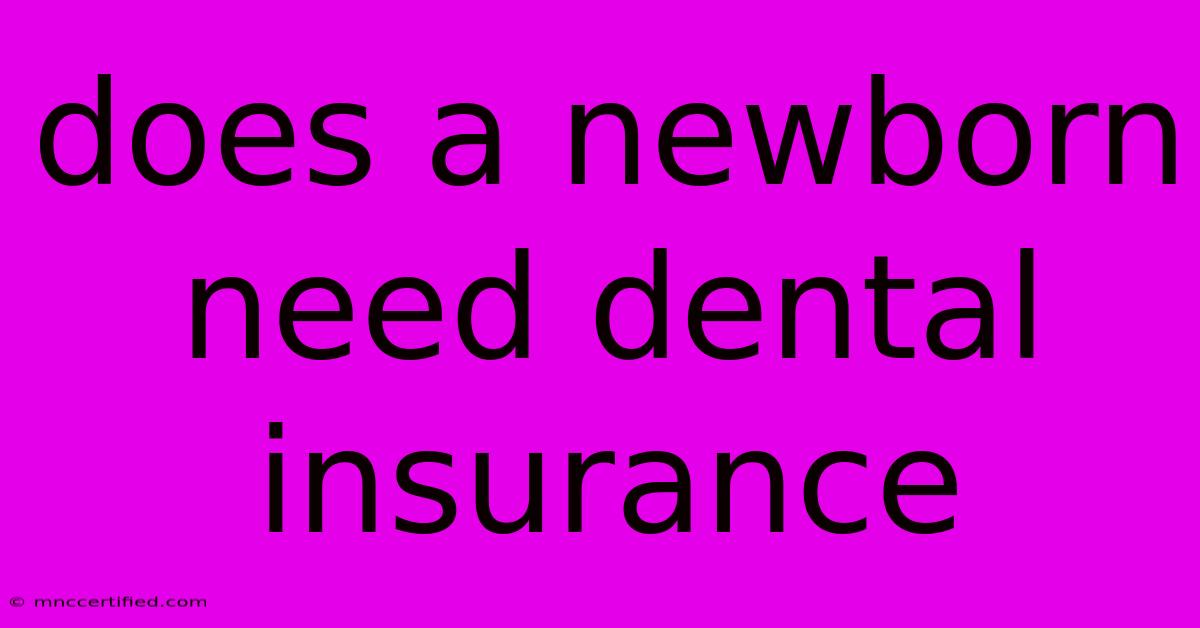Does A Newborn Need Dental Insurance

Table of Contents
Does a Newborn Need Dental Insurance? A Guide for New Parents
Bringing home a newborn is an exciting, but overwhelming, experience. With so many things to think about – feeding, sleeping, and diaper changes – it’s easy to overlook seemingly less urgent matters, like dental insurance. However, it’s important to consider the long-term benefits of having dental coverage for your little one, even from birth.
Why is Dental Insurance Important for Newborns?
While your baby may not have any teeth yet, it’s crucial to understand that dental health starts in utero. The foundation for healthy teeth is laid during pregnancy, and the development of healthy gums and jaw structure begins shortly after birth.
Dental insurance for newborns can cover:
- Early checkups and consultations: Even without teeth, your baby can benefit from early visits to the dentist. These checkups can identify any potential issues early on, such as tongue-tie or a high palate, and provide valuable advice on oral hygiene practices.
- Fluoride treatments: Fluoride helps strengthen tooth enamel and prevent cavities. Your dentist can apply fluoride treatments to your baby’s teeth as soon as they erupt.
- Oral health education: Your dentist can offer guidance on how to care for your baby's gums, promote healthy eating habits, and address any concerns you may have about their oral development.
When to Enroll in Dental Insurance?
The best time to enroll your newborn in dental insurance is right after birth. Most plans have a waiting period before coverage kicks in, so enrolling early will ensure that your baby is covered as soon as their first teeth start to appear.
Considerations for Choosing Dental Insurance for Your Newborn
- Coverage: Look for plans that offer comprehensive coverage for preventive care, checkups, cleanings, and treatment for dental issues.
- Benefits: Compare the benefits of different plans, such as the amount of coverage for specific procedures, and the annual maximum coverage.
- Cost: Consider your budget and choose a plan that offers the best value for your money.
- Network: Check the dentist network for the plan to ensure that there are qualified dentists in your area.
Are There Alternatives to Traditional Dental Insurance?
While traditional dental insurance is a popular option, there are other ways to cover your newborn's dental expenses:
- State-funded programs: Some states offer dental programs for low-income families.
- Employer-sponsored plans: If your employer offers dental coverage, your newborn may be eligible to join the plan.
- Health Savings Accounts (HSAs) or Flexible Spending Accounts (FSAs): These accounts allow you to set aside pre-tax money to pay for medical expenses, including dental care.
Conclusion
Investing in dental insurance for your newborn is a smart move. It can provide peace of mind, knowing that your baby has access to early dental care and preventative services. By choosing a plan that meets your needs and starting coverage early, you can set the foundation for a lifetime of healthy smiles.

Thank you for visiting our website wich cover about Does A Newborn Need Dental Insurance. We hope the information provided has been useful to you. Feel free to contact us if you have any questions or need further assistance. See you next time and dont miss to bookmark.
Featured Posts
-
49ers Beat Buccaneers Moody Wins Despite Misses
Nov 11, 2024
-
Florida Health Insurance License 240
Nov 11, 2024
-
Jets Fall To Cardinals Rodgers Stays Silent
Nov 11, 2024
-
Cardinals Dominate Jets Murray Shines In 31 6 Win
Nov 11, 2024
-
Sundays Primeira Liga Benfica Vs Porto Matchup
Nov 11, 2024